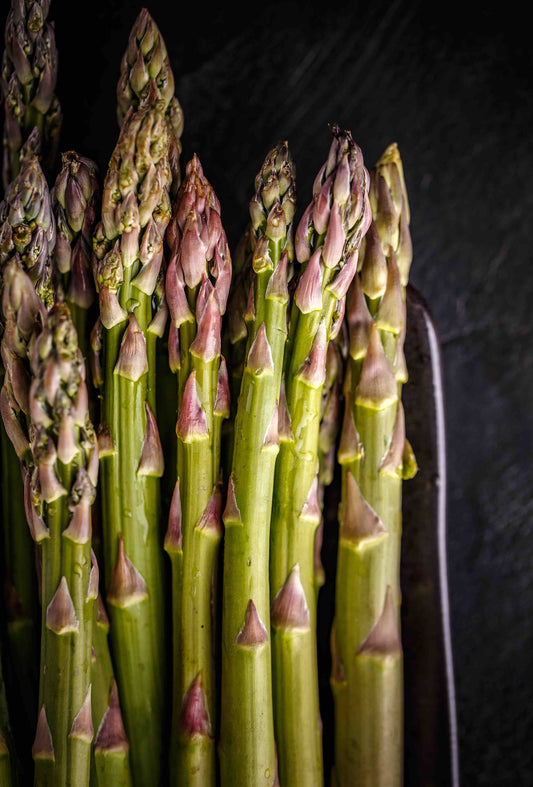Collection: Asparagus Seeds
Going from the garden to the kitchen can take a long time for Asparagus, because asparagus is a very long term crop with seeds taking up to three years to produce a harvest. It's a lengthy process, but well worth the wait, and out Asparagus Seeds are the perfect addition to any garden, especially for those gardeners who love a challenge.
These tender vegetable plants can yield harvest for 15 to 20 years, and our seeds are the perfect way to begin your journey. All of our asparagus seeds produce deliciously tender spears and tight green buds that are the perfect addition to any homemade meal.
All of the varieties of asparagus we offer are well suited to the UK climate and will product high quality spears.
-
 Sold out
Sold outAsparagus Ariane F1
Regular price £3.49 GBPRegular priceUnit price / per
Whether you are looking for a challenge, or interested in learning more about the developments of plants, our asparagus seeds are the perfect addition to your garden.
Browse our range of seeds below and plant your asparagus seeds so you can enjoy them home grown and stir fried.
Benefits of Growing Asparagus from Seeds
Adding our asparagus seeds into your vegetable garden offers several advantages. Seeds are the most cost effective option for growing asparagus and it's always a nice feeling knowing the love and time that has gone into growing these plants.
Our selection of seeds is specifically tailored to UK climates and preferences, ensure they are a perfect match for every garden.
Beyond all of this, out seeds are a long term investment as these seeds can create plants that can yield harvests for 15 to 20 years! Embrace the journey of growing asparagus from seeds and enjoy the benefits for years to come, if you're a UK based customers, all you need to do is click add to basket!
Growing Conditions
To get the best results from our asparagus seeds, there are some growing conditions to provide them with that will allow them to thrive.
In the UK, our seeds should be planted in areas with moderate temperatures, seed compost, and ample sunlight during the growing season. It performs bests in cool winters and sunny summers.
Plant the seeds in well drained, fertile soil and you'll have flourishing asparagus in no time! It's best if the planting soil is rich in organic matter (compost or manure) as this promotes healthy root development.
Whether you're starting a new garden or expanding an existing one, ensuring these conditions are met will help you enjoy a plentiful harvest of delicious, homegrown asparagus.
Planting Advice
Sowing asparagus seeds at the right time is crucial for ensure you get a successful asparagus plants. The best time to sow these seeds is in early spring (March to May) or early summer as this allows the seeds to take advantage of increasing daylight and the warmer temperatures of the soil.
Depth and Spacing
When planting asparagus seeds, it's important to follow specific guidelines for depth and spacing to promote healthy plant development:
Plant asparagus seeds approximately 1 to 2 inches deep in the soil. Ensure the seeds are covered with a thin layer of fine soil or compost to provide adequate coverage without burying them too deeply.
Space seeds about 2 inches apart in rows that are at least 12 to 18 inches apart. This spacing allows each seedling ample room to develop roots and foliage without competing excessively with neighboring plants.
Germination Period
Asparagus seeds typically germinate within 2 to 6 weeks under optimal conditions. During this period, maintain consistent soil moisture to support germination without saturating the soil. The ideal soil temperature for germination ranges between 18-24°C. Using a seedling heat mat can help maintain steady soil warmth if planting early in the season when temperatures may still fluctuate.
Once seeds germinate, continue to monitor soil moisture levels to ensure seedlings establish well. Asparagus seedlings are delicate initially, so gentle watering is essential to prevent disturbing the seeds or young plants. As the seedlings grow, gradually increase watering frequency to keep the soil evenly moist, but avoid water logging, which can lead to root rot.

